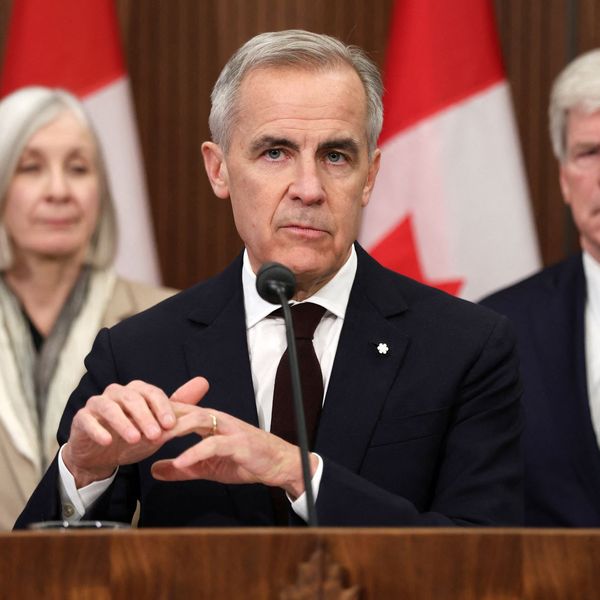Ignoring warnings from the world's most prominent climate scientists who say that pursuit of mega-carbon projects like development of Alberta's tar sands will lead to 'climate chaos' and irreversible tipping points, 53 US Senators signed a letter on Wednesday urging fast-track approval of the controversial Keystone XL pipeline.
The letter, spearheaded by Sens. John Hoeven (R-N.D.) and Max Baucus (D-Mont.), employed what has widely been called a false dichotomy by asserting that protecting the environment and moving away from a fossil fuel dependent energy system was incompatible with job creation or economic prosperity.
"We ask you not to move the goalposts as opponents of this project have pressed you to do," the letter read. "We urge you to choose jobs, economic development and American energy security."
The letter proves that a majority of lawmakers in the upper chamber of Congress have not been swayed by the sizable groundswell of environmental activism around the Keystone XL project and climate change more broadly.
However, as upcoming events seek to show, the climate justice movement--taking aim at several pipeline projects pushed by the world's largest oil companies--appears to be ascendent, with plans to bring their message to elected leaders and the fossil fuel industry directly in the weeks and months ahead.
This weekend, for example, regional allies across the northeast are coming together to protest proposed plans to bring tar sands oil through an existing pipeline system that runs from Montreal, Canada to Portland, Maine.
Billed as the 'largest tar sands protest in the Northeast,' groups from across New England will join campaigners on the Canadian side of the border standing in opposition to a plan by Canada's Enbridge oil company and US-based ExxonMobil to transport Alberta's tar sands eastward via a series of flow reversals in existing pipeline systems controlled by the two companies.
As The Forecaster, a local newspaper in Maine, explains:
The pipeline is currently used to pump light crude oil from the South Portland tanker facility to refineries in Canada. The tar-sands proposal would reverse the flow in one of the pipeline's two underground pipes, sending tar sands from Alberta, Canada, to Maine.
Tar sands, also known as bitumen, is a viscous mix of oil, sand and clay. Because it is heavier and more corrosive than light crude, some experts say, the thick goo could force the pipeline to spring a leak.
"ExxonMobil is gearing up to move dirty tar sands oil east through Ontario and Quebec into New England to reach a shipping port in Portland, Maine," reads a statement from the coalition organizing the protest. "But the people of eastern Canada and New England have their own plan and are forming a wall of opposition to keep the east tar sands free."
"We call on the National Energy Board of Canada to deny approval of the Canadian section of this tar sands pipeline, and on the U.S. State Department to conduct a full environmental review which allows complete public input," said David Stember from 350.org, which is helping to organize the Portland rally along with other national groups including the Sierra Club and National Wildlife Federation, and local groups including 350 Maine, Environment Maine and the Natural Resources Council of Maine.
"Given his commitment to tackling climate change, we believe President Obama should deny this project a Presidential Permit," said Stember.
"Maine and the region have everything to lose and nothing to gain from sending toxic tar sands across our state," said Lisa Pohlmann of the Natural Resources Council of Maine. "Hundreds of people will descend on Portland Saturday to make a point: We cannot afford the risk of tar sands oil oozing across the Northeast in Exxon's pipeline and we will be calling on the State Department to demand an environmental review of this risky proposal. There is too much at stake."
The specific action in Maine is designed to build regional resistance to what activists see as a national and international struggle against the fossil fuel industry's stranglehold on the global energy system. With an acute sense that NIMBYism (meaning 'not-in-my-backyard) style-environmentalism has plagued the movement for years, climate justice activists make it a point to say that their objection to one pipeline or another is only part of a deeper strategy whose chief aim is keep toxic fossil fuels like tar sands "in the ground" and undeveloped.
"This pipeline runs across rivers and streams that include world-class aquatic habitat" said Carol Foss, director of conservation at Audubon New Hampshire. "Between the enormous risk to our wildlife and waterways and the lack of benefit to our communities, opposing this pipeline project seems like a no-brainer. We don't need tar sands spilled in our waters, and we don't need its climate impacts, period."
As Texas landowner Eleanor Fairchild said during a protest against the Keystone XL pipeline last year: "Tar sands is the dirtiest fuel on the planet, and I want the world to know that Texans do not want this pipeline forced through their homes."
But, pushing back against the argument that her stance was solely about protecting her own property and water supply, Fairchild added: "From the White House to my house, I don't want this pipe threatening anyone's house anywhere in the world!"
The growing revolt around the tar sands seen from New England to Texas, from Vancouver to Montreal and many places in between, will next put its focus back on President Obama--and perhaps the fifty-three Senators who signed the letter yesterday--by planning a large-scale weekend of protest in Washington, DC in February.


